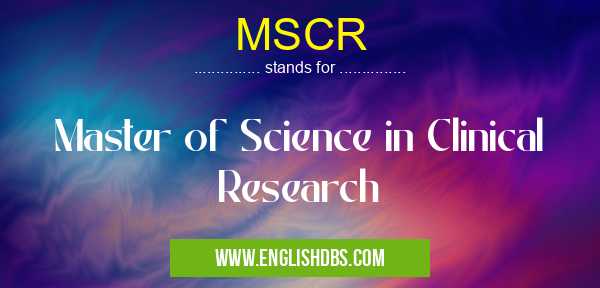What does MSCR mean in ACADEMIC DEGREES
A Master of Science in Clinical Research (MSCR) is a graduate program that helps students understand and identify the principles and methods used to develop, implement, and assess clinical research. The degree provides students with an in-depth knowledge of health sciences and prepares them to pursue careers in clinical research. With this degree, students can apply their understanding of science, medicine, math, and statistics to interpreting data collected during medical trials while also understanding the ethical implications of research involving human participants.

MSCR meaning in Academic Degrees in Academic & Science
MSCR mostly used in an acronym Academic Degrees in Category Academic & Science that means Master of Science in Clinical Research
Shorthand: MSCR,
Full Form: Master of Science in Clinical Research
For more information of "Master of Science in Clinical Research", see the section below.
Program Objectives
The aim of the MSCR program is to create a curriculum which allows students to develop skills that are vital for success in the field such as critical thinking, communication, and problem-solving. Additionally, this program emphasizes independent study so students can take practical steps towards becoming career experts in clinical research. Furthermore, this program seeks to provide invaluable components such as extensive classroom instruction as well as laboratory opportunities where real world scenarios can be encountered.
Benefits
The MSCR degree offers graduates robust benefits tailored for those eager to become leaders in developing new treatments for diseases or conditions which affect human lives. These courses will give individuals the tools needed to evaluate and design effective clinical trials or other advanced methodology for conducting studies involving humans or animals. An MSCR degree holder will have ample job opportunities available compared to professionals without any postgraduate education related to clinical research specifically. This degree program offers graduates opportunities that involve transforming basic science into consumer healthcare products or services applicable by medical professionals at their medical facility.
Essential Questions and Answers on Master of Science in Clinical Research in "SCIENCE»DEGREES"
What is MSCR?
MSCR stands for Master of Science in Clinical Research. It is a post-graduate program designed to provide comprehensivetraining in clinical and translational research, enabling participants to become independent clinical investigators.
What does an MSCR involve?
An MSCR involves coursework on biostatistics and epidemiology, health services research and other disciplines related to the conductof clinical research projects. Participants also receive mentored experience with ongoing clinical studies at Brown, as well as time devotedto completting a research or thesis project.
Who should pursue an MSCR?
The MSCR program is designed for individuals who wish to acquire skills necessary to become independent investigators in the field of clinically oriented research activities, including the design and conduct of clinical trials and systematic reviews.
What are some of the benefits of earning an MSCR?
Earning an MSCR can enable learners to advance their existing careers or open doors to new professional opportunities in academic medicine, biomedical device innovations, health services research and many other related fields. Additionally, the degree may enhance your ability to secure funding for clinical investigations.
Is there any kind of financial aid available for those pursuing an MSCR?
Yes! There are a number of sources from which you may be able to receive financial aid during your graduate studies. This could include federal student loans, employer tuition reimbursement programs, private scholarships or fellowships from universities or external organizations dedicated to advancing medical science-related disciplines. Our office can help answer specific questions about possible sources of funding support for which you may qualify.
Who is eligible for the MSCR program?
The program is open to individuals who have obtained either a doctoral level degree or its equivalent in an area relevant to translating basic scientific findings into clinical applications (e.g., MD/DO/DVM); newly matriculated students holding masters-level degrees; or advanced practice clinicians (nurse practitioners, physician assistants) with educational backgrounds in health care professions other than medicine who have achieved national certification status through board-certification examination processes (e.g., ANCC/NCCPA).
How long does it usually take someone to finish an MSRC program?
Generally it takes two years for full-time students (five semesters) and three years for part-time students (seven semesters) when the core course requirements are complete before completion of the research requirement. This timeline can vary per student depending on individual interests, aptitude, availability and commitment levels towards finishing coursework requirements and conducting active research simultaneously.
What kind of employment opportunities will I be qualified for upon graduation from an MSRC program?
Upon completion of this degree program graduates have unique qualifications that span across multiple facets within the field of clinical research such as biomedical device development evaluation; data analyst positions; grant preparation roles; study coordination jobs; medical writing & strategic planning roles; immunology & genetics specialty positions and more.
Are there any resources available that can help me understand more about this field before applying?
Absolutely! You can start by visiting our website where you'll find information on our curriculum requirements as well as advice from current students & alumni on transitioning successfully into academic medicine careers upon completion of their degree programs.
Final Words:
An MSCR degree is essential for anyone who is interested in making an impactful difference through innovative treatments across many different fields of medicine today. With this degree's comprehensive curricular structure being rooted heavily into core principles within its realm of expertise, it certainly serves as an advantage over non-degree holders when it comes time to finding employment within the industry. For those interested in making contributions through advanced methods within healthcare service delivery systems worldwide - an MSCR is definitely worth obtaining!
